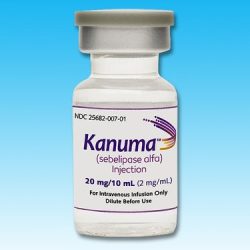Description
ONCASPAR (Pegaspargase) Uses
Pegaspargase specifically is an asparagine specific enzyme used as a component of a multi-agent chemotherapeutic regimen to treat pediatric and adult patients with:
- First-line acute lymphoblastic leukemia.
- Acute lymphoblastic leukemia and hypersensitivity to asparaginase.
Dosage: The recommended pegaspargase dose for patients up to and including 21 years of age is 2,500 International Units/m2, and for adult patients aged more than 21 years is 2000 International Units/m2 intramuscularly or intravenously no more frequently than every 2 weeks.
Side Effects: The most commonly reported pegaspargase side effects are:
- Hypoalbuminemia
- Elevated transaminase
- Febrile neutropenia
- Hypertriglyceridemia
- Hyperglycemia
- Bilirubin increased
- Pancreatitis
- Abnormal clotting studies
- Embolic and thrombotic events
- Hypersensitivity
Warnings and Precautions:
- Pancreatitis may occur in patients receiving oncaspar 3750. Hemorrhagic or necrotizing pancreatitis with fatal outcomes have been reported.
- Glucose intolerance can appear in patients receiving pegaspargase. In a few cases, glucose intolerance is irreversible. Serum glucose should be monitored.
- Patients with pegaspargase injection should be assessed for symptoms of hemorrhage with coagulation parameters including PTT, PT, fibrinogen.
- Assess bilirubin and transaminases at least weekly during pegaspargase treatment at least 6 weeks after the last dose.
- On behalf of published literature studies in pregnant animals, oncaspar 3750 can be responsible for causing fetal harm in cases administered to a pregnant woman.
- Patients are advised to notify their healthcare practitioner promptly in the event of a pregnancy, or in case pregnancy is suspected during pegaspargase injection treatment.



